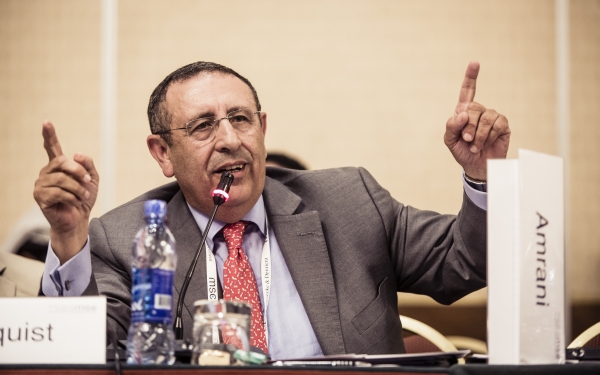
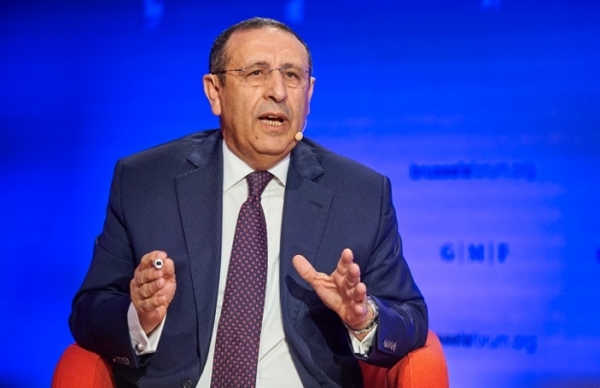
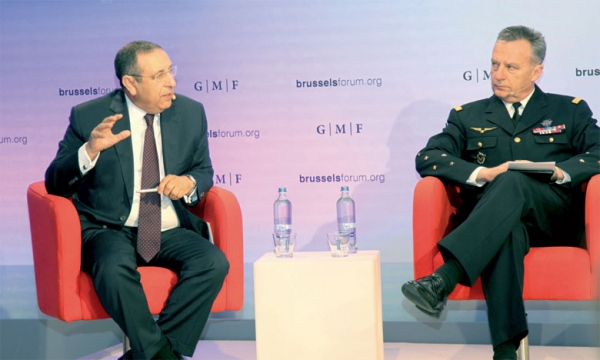
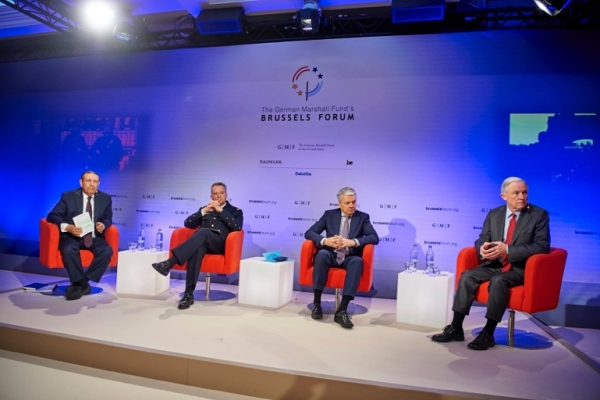
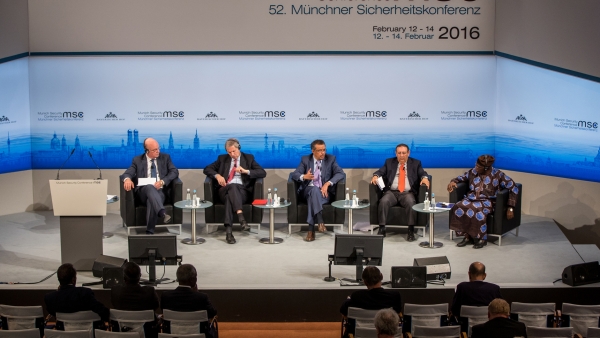
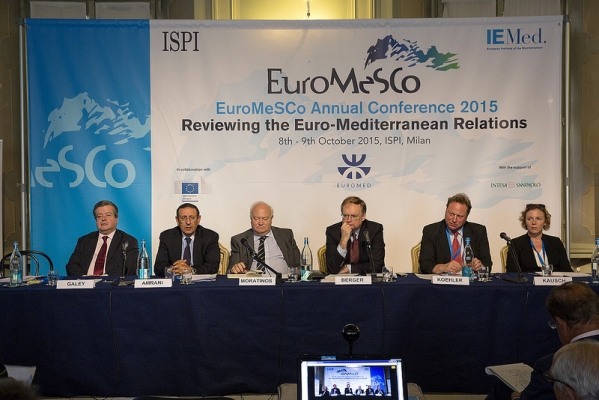
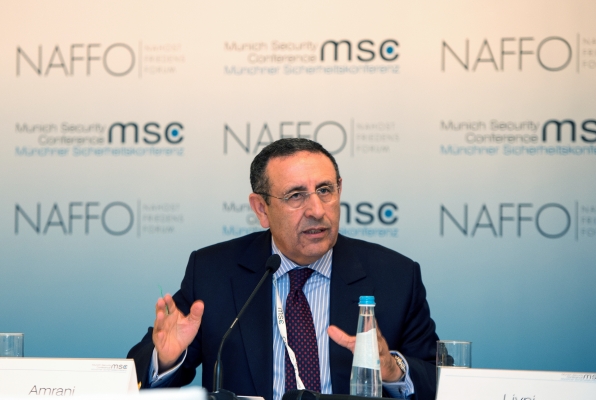
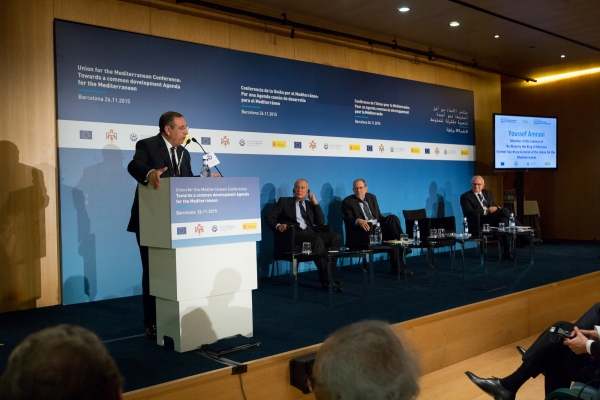
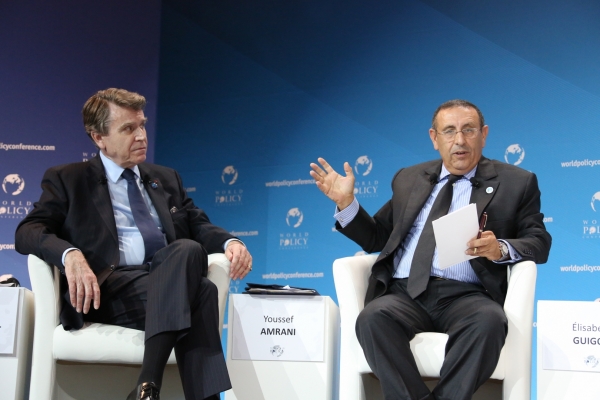

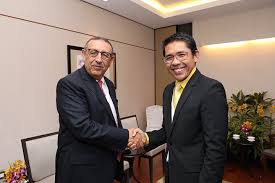
Youssef Amrani has participated at The IISS Shangri La Dialogue is Asia’s premier defense summit which is attended by Defense ministers of 28 Asia Pacific’s countries. Shangri La Dialogue is an opportunity for policymakers to share different perspectives, ideas and knowledge on the region’s security and defense issues. Since its launch in 2002, the Dialogue has become the best opportunity for proposing initiatives and responses to important security issues. This year the Summit focused on the many defense and security challenges facing the Middle East’ s region. In the frame of the 2018 Shangri La Dialogue, 1st-3rd June 2018, Minister Amrani emphasized some remarks:
If we pause to think about the highly volatile current state of international affairs, the “future of the Middle East” may seem like an impossible question to address. But it needs an answer and it must be a collective one.
We have undoubtedly reached a crossroads and the time has come to choose a path, both as a region and as an international community. For now more than ever, it is an absolute necessity to think about what future we want for our region.
The present – the Middle East’s dark Reality within a rapidly changing world :
The Middle East continues to experience immense change and faces complexes challenges arising from a fragmentation and deconstruction of the Arab World. The Middle East remain highly volatile and breakdowns, aggravating the balkanization of the Arab world.
I will limit myself to 3 trends:
The ongoing crises and their impact on the region:
The protracted conflict in Syria continues to generate spillover of instability into Iraq and the Levant, which face their own political and socioeconomic pressures. In many places, political actors disagree over the legitimacy of institutions, high unemployment and economic grievances persist, and old and new security threats distract from the routine challenges of governance. Syria, Iraq, Libya, and Yemen sank decisively into the ranks of failed states with no longer any effective central authority over the expanse of national territory. ISIS arose as the largest radical threat in the region’s modern history, challenging political borders and order and proposing political identities and governance paradigms.
The hope that Libya’s 2011 uprising against Colonel Muammar Gaddafi once generated has been shattered by the country’s descent into a complicated civil war. We cannot allow instability that has prevailed in Libya and the resulting threats to Libya’s neighbors, but also to Europe, such as the terrorist threat, all sorts of trafficking, migration flows…Despite the Skhirat deal, the country continues to be ravaged by different militias, while the eastern and southern parts of the country have become havens for violent Islamists.
Then there is the key Palestinian issue, which remains unresolved but has now been relegated in the hierarchy of emergencies. This conflict, which continues to fuel frustrations and violence in the Arab world, cannot be detached from its regional environment. To think that the Middle East could regain stability without finding a lasting solution to this conflict is an illusion.
This then leads me to the real question at hand: Why does the International Community still fail to achieve this? Why do we remain so deeply divided on the approach, methods and means that can help us work together to solve ongoing crises?
Today, the international community has not been able to come up with solutions to the current crises, particularly through the reform of the Security Council. The divisions among the members of the security council concerning Syria or the persistent deadlock in the Israeli-Palestinian peace process is an example of these divisions.
One of the obvious reasons behind the failure of the International Community to work together effectively whether at the regional, sub-regional or multilateral level, is the identity crisis that the Nation-State has been facing ever since globalization took over.
There is also the situation in the Maghreb. The notion of the “Arab Maghreb” has been diluted. Today, let us be lucid: the Maghreb is down at all levels remains the least integrated region of the world, due to the lack of political coordination, the weakness of economic integration and the fragility of security cooperation, all exacerbated by the Libyan crisis and the intensification of security threats. Unfortunately, the Maghreb today is inoperative. As His Majesty King Mohammed VI stressed in his address to the 28th AU Summit in Addis Ababa, “the flame of the Arab Maghreb Union has faded, because faith in a common interest has vanished!”. Genuine Maghreb ambition is lacking, just like political will.
This, however, should not deter us from doing our job at home, in order to gather the synergies required to come up with tangible models for the region’s integrated, sustainable development.
On the other side of the Arab periphery, close to the shores of the Atlantic Ocean, the Sahara-Sahel region is clearly concerned to varying degrees by the current security developments and their vision of the future are constantly and directly influenced by the multiform challenges (arms circulation, drugs, smuggled wares etc.) and migrants across the grey zones within Sahel. The growing mobility of conflicts means that there is a real prospect of deeper links between regional terrorist groups such as Daesh, AQMI, and Boko Haram who settle and spread, destabilizing all the region and other parts of Africa.
In parallel, governance deficits and the lack of development have become even more problematic. The many crises in our region have severely hurt economies, destroyed state infrastructure and restricted the space afforded to basic human rights. In this context, the absence of effective regional cooperation, combined with weak institutions and bad politics all add to a very toxic mix of ingredients. Today we need better governance of economic and social policies in the region, enhancing inclusiveness and a multidimensional development, contributing to better peace, prosperity and stability in the region.
An efficient cooperation is urgently needed to address the interconnected web of chronic socio-economic challenges ranging from poverty, marginalization, youth unemployment and inevitably leading to extremism and terrorism.
Now the common threat throughout the region is violent Extremism. Now it seeks to create its own political entities. This brings us to the threat of Daesh and other radicalized groups which have taken hostage our faith and used it to exploit the fear of disenfranchised individuals in order to spread hatred, ignorance and division. Across the region, emerging non-state actors are seeking to protect their communities, assert what they consider to be their rights and persecute those they deem criminals or traitors. This phenomenon cause a global threat to stability and security, has heavily impacted in the Maghreb and the Arab world. The fight again terrorism needs today, more than ever, a pragmatic and responsible approach through an effective security cooperation.
Addressing the issue of the fight against terrorism under the exclusive prism of security concerns is an incomplete response that involves significant risks in terms of reversibility. This confirms too that no state or multilateral actor, however powerful it may be and also military interventions, cannot impose alone, crisis and terrorism exit solutions.
What do we need today to ensure stability and security in the region ?
What does all this mean for our region and for the Middle East’s future ? All I can tell you is that the answers to our common challenges have one obvious common denominator: We need to work together through a common strategic vision for the region, at the regional and international levels, to tackle the problems that we face in security, stability and development. We must work closely on all the issues that concerned peace and security in the region. This start by:
Resolving the ongoing conflicts in the region:
Political and peaceful solution to these crises is needed, respecting the sovereignty and territorial integrity of the states. I think that detailed strategy, similar to the Marshall Plan that helped rebuild Western Europe following the Second World War, is needed for Syria and Iraq. This could ensure « there are functioning local economies, so that we don’t have that kind of desperate situation that forced many locals to turn to ISIS. Post-ISIS efforts also need to include some sort of rehabilitation for those who continue to feel isolated and may still harbour ISIS sympathies.
In Libya, progress has been made, but for these successes to be sustainable, Libya must be able to return to unity, stability and security. It is with this in mind and to achieve an inclusive political solution, based on the Skhirat agreement. Today, we must support the work of the UN special envoy, Mr. Ghassan Salamé, in his efforts to promote dialogue between the Libyan parties.
Playing our part as countries of the region:
The achievement of inclusive and multidimensional development is one of the foremost challenges. It hinges on striking the right balance between the imperatives of economic and social development, and the need to preserve institutional achievements as well as the rights of future generations. Moreover, we should seek to forge a unique development model based on the specificities of each country in order to benefit from shared prosperity, mutual economic opportunities and mutually beneficial human development. In this respect, I would like to share with you some views about collective answers that should be part of a genuine drive for change in our working methods, similar to a « Marshall Plan for the Arab world, » which can help us rise to challenges in its three areas:
By ensuring, first, the internal stability of all countries in the region, initiating institutional reforms, that would consolidate the rule of law, contribute to the development of inclusive, participatory democracies and secondly, a good public governance to develop the intrinsic capacities of States through the inclusion of all national forces in the achievement of a new political and social balance.
The opportunities in our region have to do with the economic development and investment and the building up of coherent regional groupings. By making sure we have the means to position ourselves on the global economic arena, hence the importance of working towards the emergence of an influential regional grouping built on mutually beneficial cooperation.
One must admit that Arab countries are today having difficulties to integrate their youths. The despair caused by this situation has a serious impact on stability in the Euro-Mediterranean region, which is facing the threat of radicalization of young generations. It is therefore important to bring about conditions for the formulation of new models for economic growth from which the entire region would benefit, including by setting the stage for a new sustainable development model which is more inclusive;
By implementing effective, multifaceted security cooperation to stem the threat of terrorism and Violent extremism. Though several regional and international initiatives have been undertaken (United Nations, European Union, League of Arab States …), progress, so far, has been limited. It is up to us to set up the necessary mechanisms that can make our region immune to the terrorist threat. Our approach should be based on a realistic, comprehensive and consistent strategy that would deconstruct the jihadi hate speech and violence-prone discourse.
Collective answers:
In this respect, I would like to share with you some views about collective answers that should be part of a genuine drive for change in our working methods, as a region, to respond to our common challenges and address their root causes:
We need to establish a model of global governance based on the respect of the specificities of each country of the region.
We need to work on the building the foundations for a new, fairer economic order. This must be an inclusive order, where the citizen is the priority and where progress and development is defined as human development, in its holistic concept.
We need strong and coherent and pro-active regional integration to counter the region’s underdevelopment. Our region is rich by its youth and complementary resources. We need to start working more closely together to solve our issues according to our values and beliefs.
We need to address our region’s issue of Identity. Identity issues and sectarian divides are rooted in faith and so we must work together on the deconstruction of the Jihadi narrative that seeks to distort Islam. The coherence of strategies and communication endeavors in this regard is also essential in order to counter the extremists’ narrative, as efforts made by States individually will always be insufficient to fight a global threat. It is up to us to set up the necessary mechanisms that can make our region immune to the terrorist threat. This requires an approach based on a realistic, comprehensive and consistent strategy and vigorous engagement through the media: the religious leaders have a powerful role in promoting peace and tolerance.